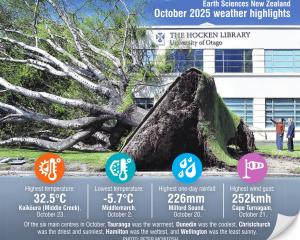
Otago accountancy and finance Professor David Lont teamed up with Victoria University (Wellington) Associate Professor Martien Lubberink and University of California (Davis) Professor Paul Griffin to analyse detailed records of "heat events" against a large sample of private and public companies in the United Kingdom and the European Union, from 2001 to 2019.
The results showed businesses suffered financially, and the effects were wide-ranging.
"On average, businesses had an annualised loss of sales of 0.63% and a profit margin decrease of 0.16% for a one-degree increase in heat spell temperature above a critical level of about 25degC.
"Aggregated for all firms over their sample, UK and EU businesses lose almost $NZ975million in annual sales for every additional degree of excessive temperature," Prof Lont said.
There were many possible reasons for this, he said.
"If it gets too hot, we might expect lower workplace productivity as staff efforts decrease, or a drop in sales due to lower customer demand as people opt to stay home.
"Degraded infrastructure, such as roads and runways melting, can cause transport issues which disrupt business and increase costs.
"Often, buildings in higher latitudes are designed to let the sun in, not keep it out.
"And this is what we find in our study — firms in more climate-vulnerable areas are impacted more."
However, Prof Lubberink said some businesses might sell more in extreme heat spells.
"Power companies, for example, sell electricity as people try to keep cool, but costs to produce might increase as well."
Researchers expected longer heat spells to degrade business performance more than shorter spells, but they were surprised to discover that length had no impact.
Prof Lont said the results were possibly just the tip of the iceberg.
Heat spells were likely to become more frequent and intense, so affected businesses should prepare to adapt, disclose their mitigation plans and the impact on present and future profits.
"Better disclosure will help assess how serious a business is about managing the effects of extreme weather events.
"Treat inadequate disclosure as a red flag.
"Mandated regulation to limit green-washing helps, and provides guidance on the type of disclosure needed, and helps business and investors price what may be a hidden risk, given the current paucity of disclosure," Prof Lont said.












